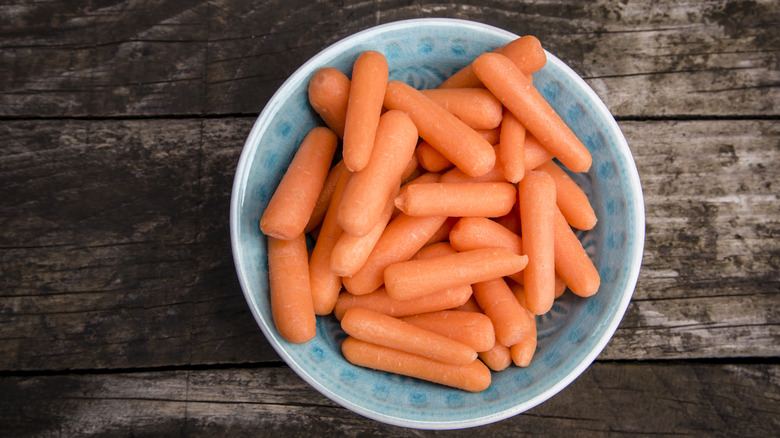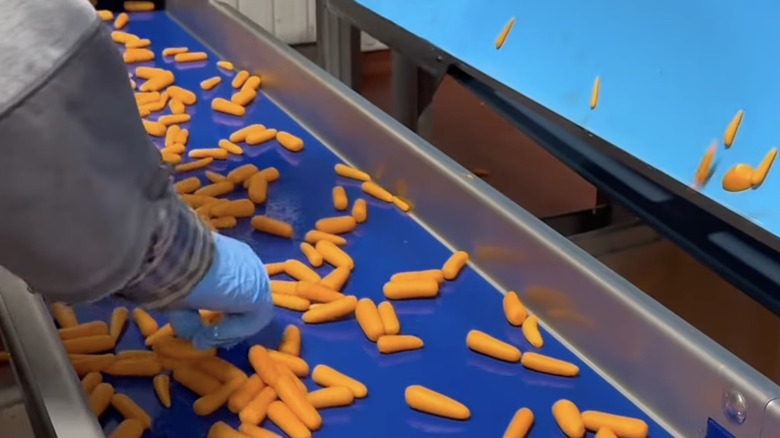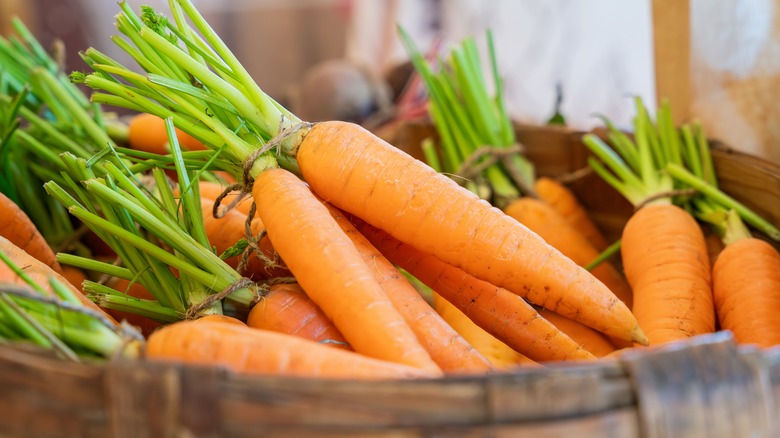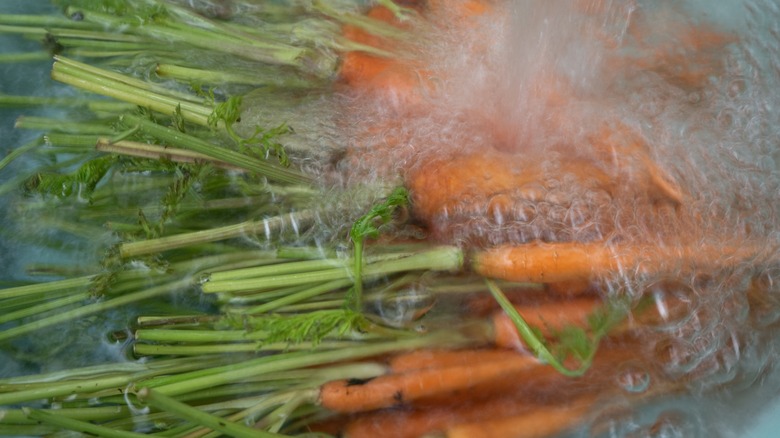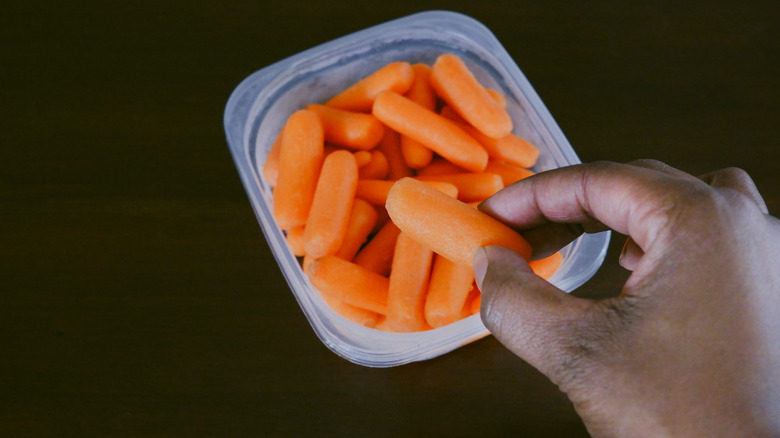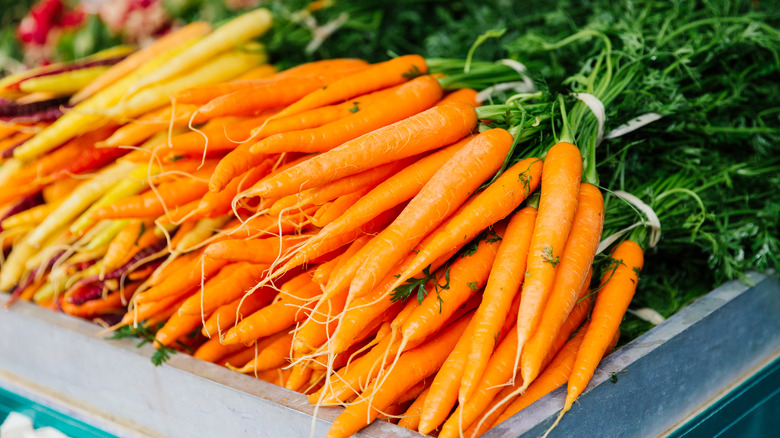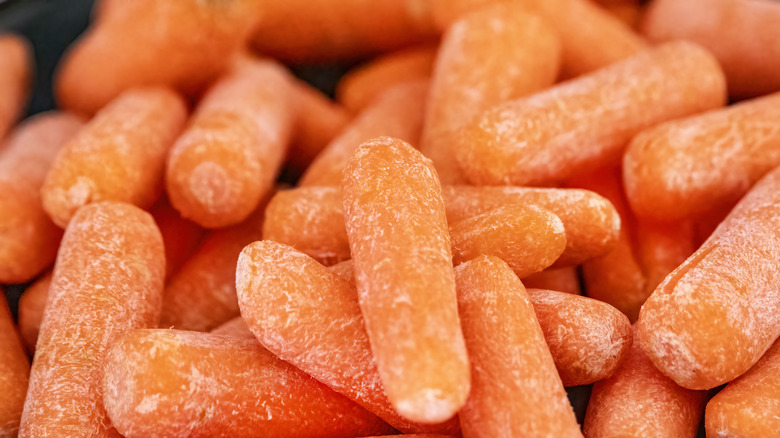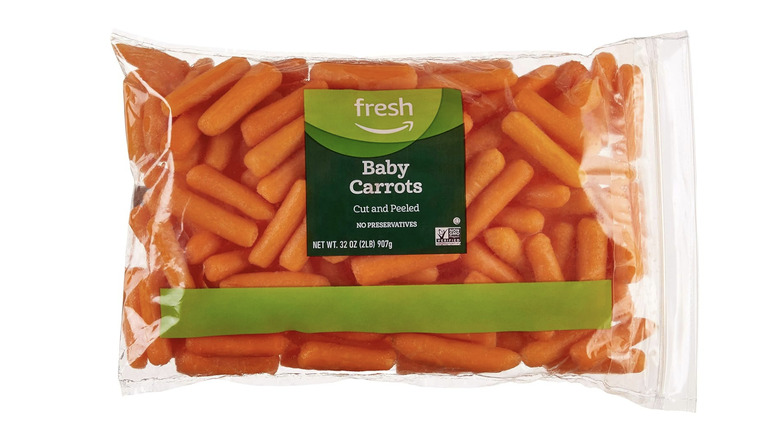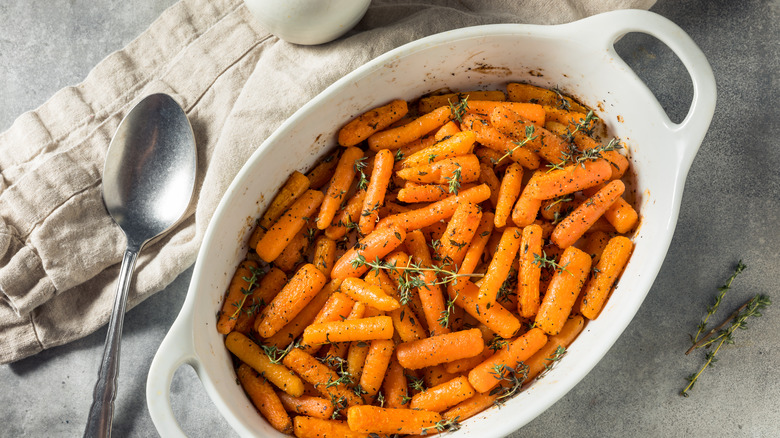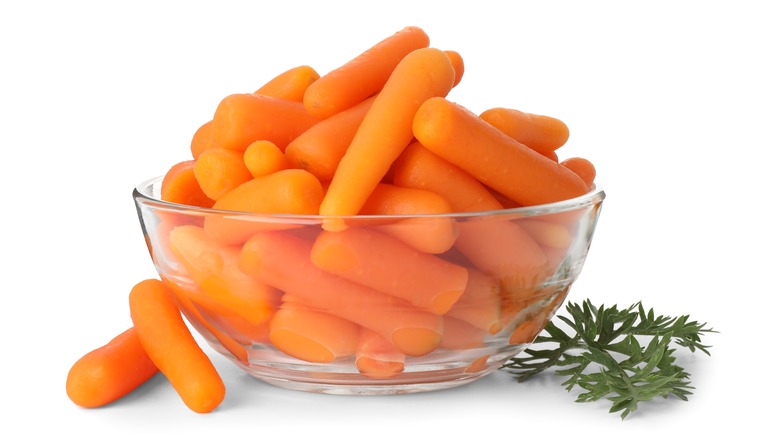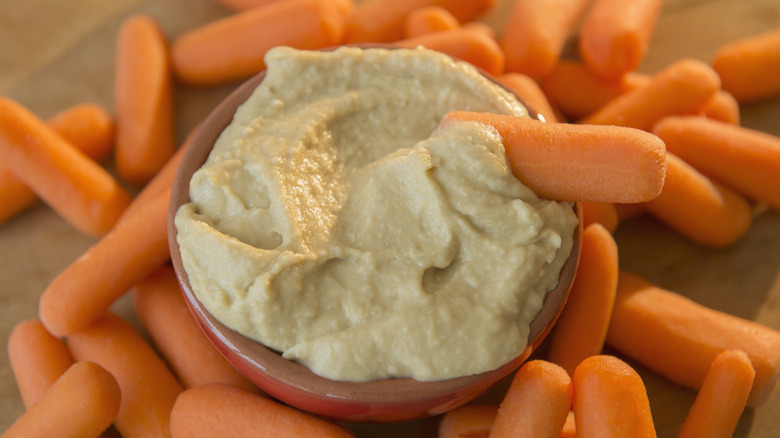Baby Carrot Myths You Should Stop Believing
We may receive a commission on purchases made from links.
America's love affair with baby carrots began in the late 1980s when California farmer Mike Yurosek revolutionized the carrot industry with his new invention. Yurosek's baby carrots were an instant hit with consumers, and today account for close to 70% of the country's carrot market.
Sold in plastic bags, baby carrots aren't just nutritious, but also convenient, with no peeling, chopping, or washing required. It's precisely this versatility that has made the mini veggies a mainstay of lunchboxes, charcuterie boards, and smart snacking routines. However, baby carrots can make a great addition to much more than just snack platters. The little sticks of goodness can be used in a variety of recipes, from sweet carrot cakes to savory dishes like roasted veggies.
Despite their popularity, baby carrots are often misunderstood. From their origins to storage requirements, many misconceptions continue to influence how people view these bite-sized veggies. Ready to find out the truth about these orange root vegetables? Keep reading!
Baby carrots are naturally grown small
If you think baby carrots come out of the ground the way you find them at the grocery store, you're in for a shock. In reality, miniature carrots are made from — drum roll — regular, everyday carrots. More specifically, baby carrots are carved out of imperfect, gnarled carrots that probably wouldn't make it into your shopping trolley at the supermarket. One standard carrot can be turned into between two and four picture-perfect baby carrots.
Baby carrots were invented in the late 1980s by a farmer, Mike Yurosek, who found it hard to sell his imperfect stock of regular carrots. In fact, in the '80s, supermarkets would reject anything other than perfect carrots, leaving farmers with produce that could only be turned into juice, used as animal feed, or discarded. Mike Yurosek's son, Dave, described the situation to CBS News, saying, "Thirty-five to forty-five percent of our carrots were rejected because of cosmetic situations — bent, broken."
In an effort to salvage some of the imperfect produce, Mike processed some of the carrots in an industrial green bean cutter and polished them in a potato peeler. This turned the craggy-looking veggies into perfect 2-inch sticks. The grocery stores in California were impressed with Mike's Bunny-Luv brand of baby carrots. In fact, the bite-sized veggies did so well that the brand was later purchased by Grimmway, which is currently the leading manufacturer of baby carrots in the U.S.
Baby carrots are much less nutritious than regular carrots
Today, most baby carrots at your local supermarket are made from the Imperator variety of carrots. Many farmers choose this carrot type due to its long and slender shape, which makes it easier to turn into baby carrot sticks. Since baby carrots are essentially regular carrots cut down to size, they have a very similar nutritional profile to whole carrots. This means that baby carrots are rich in beta carotene, an antioxidant that's converted into vitamin A, which is essential for supporting the immune system and eye health, and promoting healthy skin. Some other nutrients found in baby carrots include fiber, magnesium, potassium, calcium, iron, and zinc.
While baby carrots don't lack nutrition, they may be slightly less beneficial than their fully grown counterparts. Firstly, carrots that are turned into baby carrots are picked before they reach full maturity. This means that they may contain fewer nutrients than their larger counterparts. In addition, baby carrots are peeled, which removes the skin and its concentration of vitamins and minerals.
Baby carrots are soaked in dangerous chemicals
One of the most pervasive myths that surrounds baby carrots is that they are treated with bleach or a chemical known as chlorpropham to prolong their shelf life. Indeed, any traces of bleach or chlorpropham would make carrots not just undesirable but also a very real health hazard. Luckily, this is simply not the reality. Neither chlorpropham nor bleach is ever used in the processing of baby carrots in the U.S.
While harmful chemicals aren't used in the cleaning process of baby carrots, the miniature vegetables are washed in water with a small amount of chlorine to kill bacteria and keep the processing equipment in a sanitary state. The chlorine solution used on baby carrots complies with the guidelines issued by the FDA. It's also on par with the amount of chlorine in public water supplies. The cleaning process has been explained by Dana Brennan, vice president of Grimmway Farms, in an interview with Reuters: "This is a common, industry-standard practice and is approved for use by our organic certifying agency, California Certified Organic Farmers (CCOF) [...] We do not use any other chemicals to process our carrots. The washing and cooling process for conventional and organic baby carrots is the same."
Baby carrots keep longer than regular carrots
Both full-sized carrots and baby carrots remain fresh longer if placed in the refrigerator. That said, since baby carrots are already peeled, they are unlikely to remain fresh as long as their larger counterparts. Luis Cisneros-Zevallos, the director of the Plant Bioactives & Bioprocessing Research Lab at Texas A&M University in College Station, explained this in an interview with The New York Times, saying, "Wounding [fresh produce] sends a signal to the cells, which perceive that as if they were under attack or facing adverse conditions. As a result, oxidative stress increases in the cell [and they] start synthesizing antioxidant molecules to protect the cell from that stress."
If stored appropriately in the refrigerator, baby carrots will keep for two to three weeks, while unpeeled carrots will remain edible for between three and four weeks. To extend the life of your baby carrots, transfer them from the original plastic packaging into a resealable container or bag with an airtight seal. This will keep the carrots moist and prevent them from drying out too fast. Alternatively, you can also refrigerate baby carrots in a jar of water or a wet towel. If the baby carrots have an off smell, look moldy or slimy, or have a bendy or rubbery texture, it's time to discard them.
Baby carrots shouldn't be stored in the freezer
If you find yourself with too many baby carrots on your hands, don't fret. You can easily preserve the bite-sized snacks for up to 12 months by freezing them. However, this preservation method isn't as simple as popping the vegetables in the freezer. If you simply put the carrots in the freezer without any preparation, the carrots may lose their flavor and texture, resulting in sub-par produce when thawed.
To ensure that baby carrots stay just as crisp and delicious as the day you froze them, you should blanch them. More specifically, blanching inhibits the enzymes that can cause vegetables to lose their color, flavor, and texture. To blanch baby carrots, cook them in boiling water for around two minutes before placing them in a bowl of ice water or under running cold water. After the carrots are chilled, drain them of any excess water and line them up on a baking sheet. Place them in the freezer for around three hours. Once completely frozen, you can transfer the carrots to an airtight bag, confident that they won't stick together.
Baby carrots and regular carrots cost the same
While both regular carrots and baby carrots are essentially carrots, baby carrots are generally more expensive. Additionally, some baby carrots are cheaper than others because the cheaper ones are processed mechanically, while the more expensive baby carrots are hand-peeled. Whole carrots tend to be less expensive than mechanically peeled baby carrots.
Why is there a difference in price, you may ask? Consumers are basically paying a little extra for convenience. While peeling and cutting carrots isn't rocket science, it can be time-consuming. After all, there's something to be said for being able to eat carrots straight out of a bag. Perhaps one Quora user sums this price difference up best, saying, "[Baby carrots] are normal size carrots that have been cut and rounded by some pretty nifty processing machinery. The remnants of this process usually end up as cattle feed. Processing is not free, so there is an added cost associated with creating baby carrots." It goes without saying that this extra expense is passed onto consumers.
The white film on baby carrots is chlorine coming up to the surface
If stored improperly or for extended periods of time, baby carrots can develop a white, chalky film on the surface. Since baby carrots are washed in a solution of water and chlorine to reduce the risk of foodborne illnesses, some believe that the substance is actually chlorine making its way to the surface of the vegetable. Others are adamant that the white film is mold and is a sure sign that the carrots should be discarded.
In reality, the white film on baby carrots, also sometimes called blush, can be the result of moisture loss. As the carrots dry out, their surface becomes uneven in a way that scatters light and creates a white appearance. Luckily, there is an easy way to fix this problem. Simply leave the carrots in cold water for a few minutes to replenish the lost moisture. As it turns out, a good soaking can also bring back to life old, squishy carrots of regular size.
Another reason why baby carrots may be affected by blush is the way they are produced. Baby carrots are trimmed to shape, which damages their outer cells. This, in turn, releases enzymes that cause structural changes in the vegetable, scattering light and resulting in a white discoloration. Unfortunately, if the damage to baby carrots is on a cellular level, submerging them in cold water won't restore them to their bright orange state.
Baby carrots sold in wet packing are no longer fresh
Unlike regular carrots, baby carrots are normally sold in plastic bags. Aside from convenience and protection from physical damage, there is another great reason for this packaging. Since baby carrots are trimmed and peeled, they lack the protective skin of their larger counterparts. This, in turn, leaves them more susceptible to dehydration. The plastic packaging — which normally contains filtered water — helps the baby carrots retain moisture, keeping them fresh and crisp for a longer period of time.
Unfortunately, the moist environment of plastic bags also increases the chances that the carrots will become slimy. The unsightly buildup is simply the result of the additional liquid in the plastic bag that is there to stop the carrots from drying out. If the carrots are left in the bag for too long, this excess moisture can give the carrots a slimy exterior. To prevent the veggies from becoming slimy, simply transfer the carrots to an airtight container as soon as you bring them home from the supermarket. It's important to remember that while visually unappealing, the slime doesn't necessarily mean that the veggies are ready for the trash can.
Baby carrots are only good as a snack
Since baby carrots are sold peeled, washed, and trimmed into convenient sticks, they need no further preparation. As such, they make a convenient snack that can be enjoyed right out of the bag. Interestingly, this also means that they have a limited role in many kitchens. Baby carrots are frequently overlooked in cooking, with regular carrots normally used in soups, stews, and braises. This is a shame because the ready-to-eat form of baby carrots can save a fair bit of time in meal prep.
Since baby carrots and regular carrots are essentially the same vegetable, they can be used interchangeably in most recipes. The only issue is that in some recipes, you may need to adjust the cooking time of baby carrots due to their smaller size. Carrot recipes are incredibly versatile, ranging from savory to sweet. Notably, they include classic favorites such as carrot cake as well as more out-of-the-box culinary delights like carrot crêpes, pickled carrots, and carrot jam.
Baby carrots are sweeter than larger carrots
Since baby carrots and full-sized carrots are essentially the same vegetable, they taste the same. Of course, with more than 500 carrot varieties in the world, the specific flavor of baby carrots will depend on the type of carrot they come from. This explains the difference of opinion some people have about the taste of baby carrots.
Some consumers are convinced that baby carrots are sweeter than their larger counterparts. And, in some cases, they may be right. For instance, Bob Borda, a spokesman for the carrot grower Grimmway Farms, told Fox News that the company has engineered a hybrid baby carrot that features the best aspects of more than 250 commercial carrot types. "Naturally, you breed carrots to get the sweetest flavor and crunch," Borda said in an interview.
Interestingly, others disagree, saying that baby carrots can be less sweet and more bland in flavor than regular carrots. The reasoning behind this is that baby carrots can be made from older carrots. As carrots age, their sugars are converted into starch, leading to a decline in general flavor and sweetness.
Baby carrots aren't environmentally friendly
Baby carrots are a byproduct of our obsession with aesthetics and rejection of produce that doesn't live up to our standards of visual perfection. Just look at the vegetables at your local supermarket — they often look flawless, with uniform sizes, shapes, and colors. While baby carrots epitomize this way of thinking, this doesn't mean that they are inherently bad for the environment.
Baby carrots were developed to prevent wastage. Since supermarkets would turn their noses up at misshapen carrots, one man decided to do something about it. Instead of discarding imperfect carrots, he fashioned them precisely into what customers wanted — perfect, bite-sized produce. This meant that he no longer had to get rid of carrots that were anything less than flawless. Meanwhile, any leftovers from the production process could be used as compost, juice, or animal feed. Today, the leftovers are also commonly shredded and used as salad toppers.
